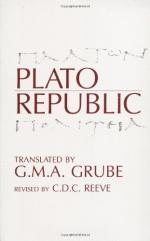|
This section contains 982 words (approx. 4 pages at 300 words per page) |

|
The Philosophy of Plato vs. Karl Popper
Summary: Compares ancient Greek philosopher Plato to 20th century Austrian philosopher Karl Popper. Compares their methodology and Popper's desire to explore the physical world through empirical methods versus Plato's belief that real knowledge is a priori.
In our modern society, most of us assume that the object of science is knowledge. However, Plato's account of knowledge is vastly different from what the "commons" today perceive as knowledge and is one that's disjointed with modern science. Plato despised science, natural philosophy, as an inferior, unworthy subject that provides "beliefs" rather than "true knowledge." In fact, his account of knowledge lies beyond the realm of the physical world, which science, in this case, Popper's account of science, is inextricably concerned with.
Plato holds the belief that real knowledge is a priori as opposed to empirical knowledge obtained through scientific methods, because "hypothesis is no longer useful, due to its limitations." To Plato, knowledge is correlated with "the truth of things", which to him is the "abstract world" or "the world of the forms", a concept which he simply assumed. The world of the forms, thus knowledge...
|
This section contains 982 words (approx. 4 pages at 300 words per page) |

|


